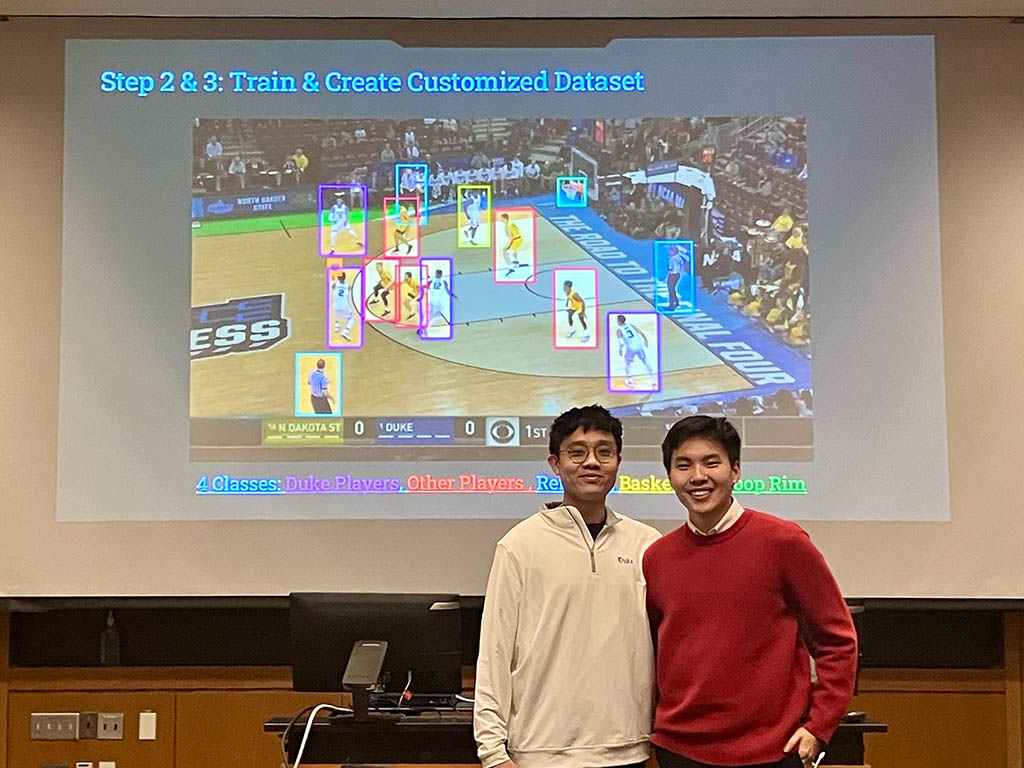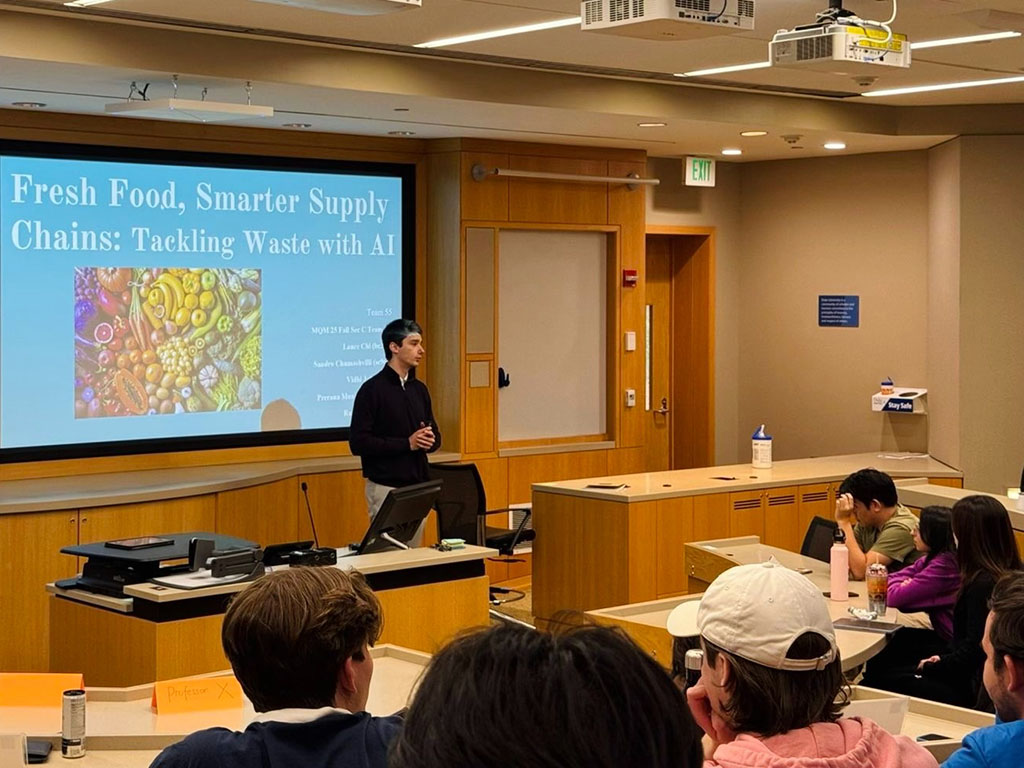AI isn’t just a tool —it’s a catalyst for deeper collaboration. At Fuqua, you’ll master the art of human-AI teamwork, learning to orchestrate diverse perspectives – both artificial and human – to solve complex business challenges. You and your classmates will learn to combine technology with human strengths to spark ideas and shape better outcomes.
The Learning Experience
AI is embedded across our curriculum—in analytics, marketing, operations, finance, leadership, and beyond. Whatever program you choose, you’ll graduate fluent in how AI shapes business decisions.
Starting with AI from Day One
On your first day, you’ll activate Duke’s private, secure instance of ChatGPT Edu. From then on, AI is integrated into your daily work—analyzing data, brainstorming strategy, and refining presentations.
With classmates, professors, and staff all operating in the same AI environment, collaboration is richer and more dynamic. And unlike consumer versions, ChatGPT Edu is designed for education: it protects your privacy and unlocks advanced features like data analysis, document summarization, and multilingual support.
How You’ll Engage with AI
Foundations
Core courses introduce AI-powered decision-making, machine learning basics, and natural language processing so you can use these tools with confidence.
Business Applications
Across marketing, finance, operations, and strategy, you’ll test how AI is shaping different disciplines —from supply chain optimization to customer engagement to taxation and financial analysis.
Ethics & Leadership
You’ll examine AI’s societal impact, from fairness in hiring to the environmental footprint of data infrastructure—preparing to lead responsibly in AI-driven workplaces.
Learning by Doing
Projects and simulations put AI in your hands. You might build a product prototype with generative AI, run an AI-powered negotiation, or explore applications in energy, health, or national security.
Team-Based AI Projects
You’ll work in cross-functional teams to tackle real business challenges using AI, learning how to blend machine insights with human creativity, cultural intelligence, and ethical reasoning. These experiences mirror the collaborative reality of modern AI implementation.
Innovating in Teaching
Faculty use AI to enhance your classroom experience —piloting custom teaching assistants, tailoring case feedback systems, and developing interactive learning tools—so you see how organizations adopt AI in practice.
Next Steps
See how AI shows up in the program that fits your goals:
Deep Dive Into the Curriculum
Decision Sciences
AI is woven into foundational analytics instruction across Fuqua’s programs, especially within Decision Sciences. Faculty like Alessandro Arlotto and Anqi Zhao ensure that core MBA courses introduce the building blocks of machine learning and AI-powered decision-making. Alex Belloni and Jiaming Xu expand on this foundation with more advanced offerings, including deep neural networks, transformer models, large language models, and diffusion models. Yehua Wei incorporates tools like natural language processing and large language models into advanced analytics courses, giving students hands-on experience with modern AI techniques. These integrations ensure that students build not just individual quantitative fluency, but the collaboration skills necessary to engage with AI systems across diverse organizational contexts.
Marketing
Marketing faculty bring AI into the classroom through real-world applications in digital strategy, advertising, and consumer research. Carl Mela exposes students to AI tools used in martech, including chatbots, personalization engines, and content generation platforms. Chris Moorman’s executive MBA course addresses how AI reshapes digital marketing investments and customer targeting. Tanya Chartrand introduces students to the automation of qualitative research through AI coding of consumer responses. These lessons prepare students to lead in marketing environments increasingly shaped by AI.
Operations Management
Operations faculty are exploring how AI transforms modern supply chains and operational strategy. Jeannette Song introduces students to AI’s role in digitizing supply chains and driving operational innovation. Bora Keskin’s electives go deeper, showing how generative AI can enhance demand prediction, real-time feedback loops, and large-scale optimization. These applications help students see how AI is not only a tool for prediction but a strategic asset in creating responsive, data-driven business processes.
Accounting
Accounting faculty at Fuqua are piloting practical ways to integrate AI into financial education. Scott Dyreng tasks students with using AI to conduct forward-looking policy analysis in taxation. Elia Ferracuti teaches students to use Microsoft Copilot for generating memos based on case data, emphasizing refinement and professional judgment. Bill Mayew uses AI to benchmark classroom performance and evaluate generative tools’ effectiveness. Together, these approaches position AI as both a practical assistant and a critical lens through which students evaluate the reliability of financial analysis.
Strategy
In entrepreneurship strategy courses, students assess AI versus human performance in customer discovery, build MVPs using generative tools, and use AI in venture design. In energy and life sciences strategy courses, faculty introduce students to sector-specific applications and limitations of AI, such as regulation and privacy.
Management and Organizations
Courses explore the ways AI is changing workplace dynamics and managerial practice. Students in electives like Navigating Organizations engage with AI-powered negotiation simulations where teams learn to integrate AI insights with human judgment and cultural awareness. and receive personalized performance feedback. In leadership and communication courses, AI is used to help students structure their thinking and develop more effective messaging. Other classes encourage responsible and reflective AI use, reinforcing the need for ethical leadership in technology-rich environments.
Ethics, Governance, Societal Impact
The impact of AI is a central theme in several Fuqua electives. Veronica Root Martinez incorporates AI-driven hiring systems into classroom debates on fairness and transparency. In sustainability-focused courses, faculty examine the environmental cost of AI infrastructure and its implications for ESG strategy. This thread of inquiry ensures that students are not only technically capable but also prepared to navigate the ethical and regulatory complexities that accompany AI in business.
Voices from the Classroom
“Our team used AI to test marketing messages, then compared results with traditional methods. It wasn’t just about the tool—it was about how we worked together to apply the insights.” – Daytime MBA student
Read more stories:








